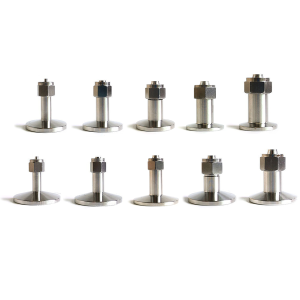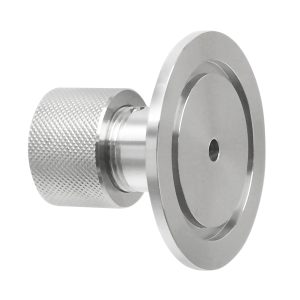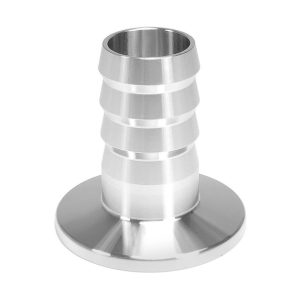KF Adapters
What are The Components of a Vacuum System?
There are many types of vacuum systems, but no matter what kind of vacuum application equipment, there is a set of exhaust system to exhaust the gas in the pumped container in order to obtain the required vacuum conditions in the vacuum container. For example: a container for vacuum processing, connect it with a vacuum pump with pipes and valves, when the vacuum pump evacuates the container, there must be a vacuum measuring device on the container, which constitutes a simplest vacuum pumping system .
The simplest vacuum system can only obtain the vacuum degree in the low vacuum range in the pumped container. When it is necessary to obtain the vacuum degree in the high vacuum range, a high vacuum pump is usually connected in series in the vacuum system shown in FIG. 1. When a high vacuum pump is connected in series, valves are usually added to the inlet and outlet of the high vacuum pump so that the high vacuum pump can maintain vacuum alone. If the high vacuum pump connected in series is an oil diffusion pump, in order to prevent a large amount of oil vapor from flowing back into the pumped container, a trap-water-cooled baffle is usually added at the inlet of the oil diffusion pump. According to the requirements, dust collectors, vacuum relay gauge heads, vacuum soft connection pipes, vacuum pump inlet bleed valves, etc. can also be added to the pipeline, thus forming a more complete high vacuum system.
For a vacuum system consisting of more than two vacuum pumps connected in series, the low-vacuum pump is usually called its pre-stage pump (or pre-pump), and the highest-level vacuum pump is called the vacuum system. The main pump, that is, it is the most important pump, the ultimate vacuum and working vacuum in the pumped container are determined by the main pump. The pipeline between the outlet of the pumped container and the inlet of the main pump is called a high vacuum pipeline, and the valve at the inlet of the main pump is called the main valve.
Usually the foreline pump doubles as a vacuum pump. The pipeline from the pumped container to the pre-pumping pump is called a pre-vacuum pipeline, and the valve on this pipeline is called a pre-vacuum pipeline valve. The pipeline from the main pump outlet to the foreline pump inlet is called the foreline pipeline, and the valve on this line is called the foreline pipeline valve, while the soft connection pipeline is set up to isolate the vibration of the foreline pump.
In summary, a more complete vacuum system consists of the following components:
- Vacuum valve
- Connecting pipes
- Pumping equipment: such as various vacuum pumps;
- Other components: such as traps, dust collectors, vacuum relay gauge heads, gas storage tanks, etc.
- Vacuum measuring devices: such as vacuum pressure gauges, various regulations;
The basic content of the vacuum system design: according to the vacuum degree requirements of the pumped container, select the appropriate vacuum system design plan, select and match the pump calculation; determine the catheter, valve, trap, vacuum measurement components, etc., and make a reasonable configuration Finally, draw out the vacuum system assembly drawing and parts drawing. The vacuum system is summarized in one sentence, which is the exhaust system used to obtain the vacuum degree with specific requirements.
Showing 1–12 of 96 results



